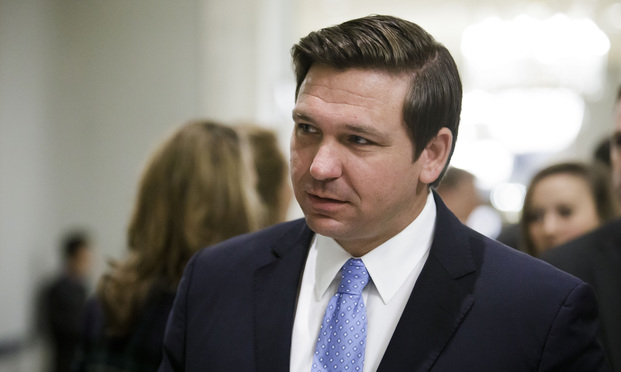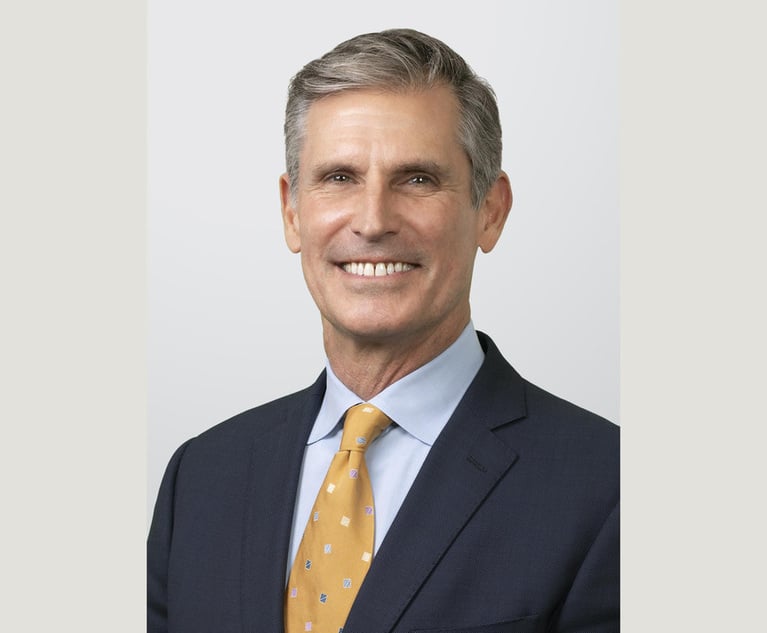DeSantis Stays Quiet on Coronavirus Lawsuit Protection Issue
Gov. Ron DeSantis did not sign on to a letter by 21 Republican governors sent to congressional leaders arguing that businesses, health care workers and schools need lawsuit protections because of the COVID-19 pandemic.
July 22, 2020 at 12:28 PM
4 minute read
 Florida Gov. Ron DeSantis
Florida Gov. Ron DeSantis
Twenty-one Republican governors sent a letter this week to congressional leaders arguing that businesses, health care workers and schools need lawsuit protections because of the COVID-19 pandemic, but Florida Gov. Ron DeSantis did not sign on.
Congress is considering another COVID-19 relief package, and many Republicans contend that liability protections need to be part of any legislation that is ultimately passed and sent to President Donald Trump.
"To accelerate reopening our economies as quickly and as safely as possible, we must allow citizens to get back to their livelihoods and make a living for their families without the threat of frivolous lawsuits," the letter to House Speaker Nancy Pelosi, House Minority Leader Kevin McCarthy, Senate Majority Leader Mitch McConnell and Senate Minority Leader Charles Schumer said. "As public policymakers, it is our duty to provide clarity, consistency, and stability to our citizens and their businesses, and the uniformity that federal law provides is critical to America's industries that work across state lines."
DeSantis' office didn't immediately respond to The News Service of Florida's request for comment or explain why he didn't sign onto the document, which was touted by the Republican Governors Association. DeSantis was one of five Republican governors who did not sign on to the request, along with the governors of Georgia, Massachusetts, South Dakota and Vermont.
It wasn't the first time that DeSantis, who is an attorney, has been mum on the issue of lawsuit protections.
DeSantis received letters in April from associations representing hospitals and nursing homes asking him to issue an executive order protecting their members from liability amid the pandemic. The Florida Health Care Association, the state's largest nursing-home association, sent a letter to DeSantis on April 3 requesting he provide nursing homes with civil and criminal protections, including safeguards from suits stemming from staffing or resource shortages.
Florida Health Care Association spokeswoman Kristen Knapp on Tuesday declined to comment on this week's letter. "We're going to keep our focus on ensuring our facilities have the resources they need to keep their residents safe and protected right now," Knapp said in an emailed statement to the News Service.
The Florida Hospital Association sent a similar letter to DeSantis on April 22 requesting that he temporarily provide legal protections to hospitals. The association proposed that the protections from civil and criminal suits last through Oct. 1. Attempts to contact the hospital association Tuesday were not immediately successful.
The first groups to ask DeSantis for protections amid the pandemic were doctors. The Florida Medical Association and the Florida Osteopathic Medical Association joined with the Florida Justice Reform Institute, an organization that focuses on lawsuit limits, and asked DeSantis in March to issue an executive order limiting liability and providing sovereign immunity protections for doctors who were complying with emergency orders that shut down optional health-care services. The letter also asked DeSantis to extend the state's "Good Samaritan Act" to apply to physicians working during the pandemic.
DeSantis did not issue any of the requested executive orders and avoided answering media questions about the requests.
Attempts to limit lawsuits, an issue commonly known as tort reform, often spur fierce political battles in Tallahassee, with plaintiffs attorneys squaring off against business and health care groups. Opponents of such limits generally contend that they penalize people who are injured because of the actions of businesses or health care providers.
Despite DeSantis' lack of action on the issue during the pandemic, Florida Justice Reform Institute President William Large said Tuesday that legal protections still are necessary.
In part, Large said a time frame people have to file lawsuits against businesses or health care providers should be shortened from the current four years to one year. Large also said evidentiary standards and culpability standards also need to be heightened to provide protections businesses need.
While DeSantis didn't approve the requests, Large said he remains optimistic that the governor supports lawsuit protections.
"The first opportunity the Legislature addresses any subject dealing with COVID-19, such as the budget, we will ask for appropriate liability [protections]," Large said.
Christine Sexton reports for the News Service of Florida.
This content has been archived. It is available through our partners, LexisNexis® and Bloomberg Law.
To view this content, please continue to their sites.
Not a Lexis Subscriber?
Subscribe Now
Not a Bloomberg Law Subscriber?
Subscribe Now
NOT FOR REPRINT
© 2025 ALM Global, LLC, All Rights Reserved. Request academic re-use from www.copyright.com. All other uses, submit a request to [email protected]. For more information visit Asset & Logo Licensing.
You Might Like
View All

Holland & Knight Expands Corporate Practice in Texas With Former Greenberg Traurig Partner
3 minute read
Forum Clause Axes $844M Case Against Reinsurer Over Deadly Plane Crash, Judge Rules

Latest Boutique Combination in Florida Continues Am Law 200 Merger Activity
3 minute readTrending Stories
- 1Haynes and Boone Expands in New York With 7-Lawyer Seward & Kissel Fund Finance, Securitization Team
- 2Upstart Insurer That's Wowing Industry Hires AIG Legal Exec to Help Guide Global Expansion
- 3Connecticut Lawyers in Spotlight for Repping FBI Agents
- 4SEC Sued for Failing to Reveal Records Involving Simpson Thacher Attorney
- 5Lawsuit Accuses University of California of Racial Discrimination in Admissions
Who Got The Work
J. Brugh Lower of Gibbons has entered an appearance for industrial equipment supplier Devco Corporation in a pending trademark infringement lawsuit. The suit, accusing the defendant of selling knock-off Graco products, was filed Dec. 18 in New Jersey District Court by Rivkin Radler on behalf of Graco Inc. and Graco Minnesota. The case, assigned to U.S. District Judge Zahid N. Quraishi, is 3:24-cv-11294, Graco Inc. et al v. Devco Corporation.
Who Got The Work
Rebecca Maller-Stein and Kent A. Yalowitz of Arnold & Porter Kaye Scholer have entered their appearances for Hanaco Venture Capital and its executives, Lior Prosor and David Frankel, in a pending securities lawsuit. The action, filed on Dec. 24 in New York Southern District Court by Zell, Aron & Co. on behalf of Goldeneye Advisors, accuses the defendants of negligently and fraudulently managing the plaintiff's $1 million investment. The case, assigned to U.S. District Judge Vernon S. Broderick, is 1:24-cv-09918, Goldeneye Advisors, LLC v. Hanaco Venture Capital, Ltd. et al.
Who Got The Work
Attorneys from A&O Shearman has stepped in as defense counsel for Toronto-Dominion Bank and other defendants in a pending securities class action. The suit, filed Dec. 11 in New York Southern District Court by Bleichmar Fonti & Auld, accuses the defendants of concealing the bank's 'pervasive' deficiencies in regards to its compliance with the Bank Secrecy Act and the quality of its anti-money laundering controls. The case, assigned to U.S. District Judge Arun Subramanian, is 1:24-cv-09445, Gonzalez v. The Toronto-Dominion Bank et al.
Who Got The Work
Crown Castle International, a Pennsylvania company providing shared communications infrastructure, has turned to Luke D. Wolf of Gordon Rees Scully Mansukhani to fend off a pending breach-of-contract lawsuit. The court action, filed Nov. 25 in Michigan Eastern District Court by Hooper Hathaway PC on behalf of The Town Residences LLC, accuses Crown Castle of failing to transfer approximately $30,000 in utility payments from T-Mobile in breach of a roof-top lease and assignment agreement. The case, assigned to U.S. District Judge Susan K. Declercq, is 2:24-cv-13131, The Town Residences LLC v. T-Mobile US, Inc. et al.
Who Got The Work
Wilfred P. Coronato and Daniel M. Schwartz of McCarter & English have stepped in as defense counsel to Electrolux Home Products Inc. in a pending product liability lawsuit. The court action, filed Nov. 26 in New York Eastern District Court by Poulos Lopiccolo PC and Nagel Rice LLP on behalf of David Stern, alleges that the defendant's refrigerators’ drawers and shelving repeatedly break and fall apart within months after purchase. The case, assigned to U.S. District Judge Joan M. Azrack, is 2:24-cv-08204, Stern v. Electrolux Home Products, Inc.
Featured Firms
Law Offices of Gary Martin Hays & Associates, P.C.
(470) 294-1674
Law Offices of Mark E. Salomone
(857) 444-6468
Smith & Hassler
(713) 739-1250






